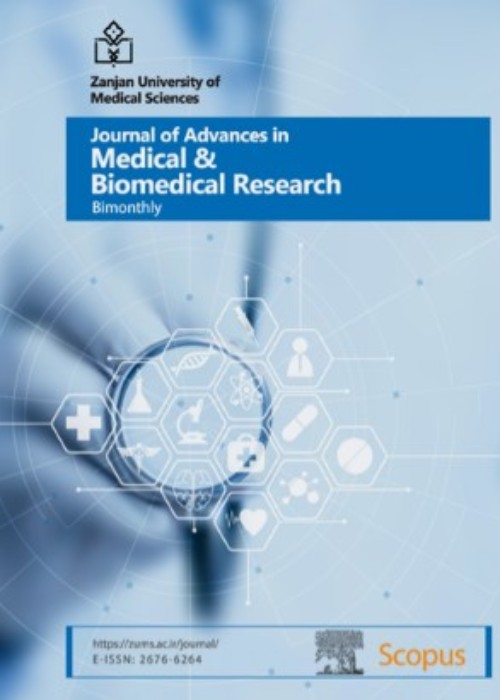Induction of Tolerogenic Murine Dendritic Cells by Downregulating the Co-stimulatory Molecule of CD40 Using Lentivirus Vector
Author(s):
Abstract:
Background And Objective
The important role of co-stimulatory molecules in immunological responses has been clearly demonstrated. With the development of new methods in molecular immunology, preventing the co-stimulatory signals in order to induce tolerance has emerged as a novel strategy. RNA interference is a new method that can specifically and effectively reduce target gene expression. Materials And Methods
In this study, we used a lentiviral system to target the expression of CD40 gene in dendritic cells. ShRNA sequence is able to reduce the expression of CD40 gene on murine dendritic cells. Results
Our results indicate 64-fold decreased expression of CD40 mRNA in the group receiving lentiviral shRNACD40 as well as 31% decrease in expression of CD40 protein on the surface of dentridic cells (p<0.0001). Also, dendritic cells cannot stimulate T cells upon contact with them. Conclusion
This study indicates that a decrease in expression of CD40 molecule induces tolerogenic dendritic cells and prevents Th1 immunological response. Prevention of Th1 response would shift the immunological responses to Th2 response, and this type of response can be effective in autoimmune diseases including rheumatoid arthritis and type I diabetes. References 1- Groux H, Fournier N, Cottrez F. Role of dendritic cells in the generation of regulatory T cells. Sem in Immunol. 2004; 16: 99-106. 2- Kanako L, Reizis L, Reizis B. Dendritic Cells: Arbiters of Immunity and Immunological Tolerance. Cold Spring Harb Perspect Biol. 2012; 4: a007401. Avalable from: www.cshperspectives.org. 3- Morel PA. Dendritic cell subsets in type1diabetes: friend or foe? Frontiers in Immunol. 2013; 4. Avalable from: http://dx.doi.org/ 10.1155/ 2013/972865. 4- Machen J, Harnaha JO, Lakomy R, Styche A, Trucco M, Giannoukakis N. Antisense oligonucleotides down-regulating costimulation confer diabetes-preventive properties to nonobese diabetic mouse dendritic cells. The J Immunol. 2004; 173: 4331-41. 5- Maldonado R, Andrian UH. How tolerogenic dendritic cells induce regulatory T cells. Adv Immunol. 2010; 108: 111-165. 6- Peters AL, Stunz LL, Bishop GA. CD40 and autoimmunity: the dark side of a great activator. Sem Immunol. 2009; 21: 293-300. 7- Li L, Wang H, Wang B. Anergic cells generated by blocking CD28 and CD40 costimulatory pathways in vitro ameliorate collagen induced arthritis. Cell Immunol. 2008; 254: 39-45. 8- Zheng X, Suzuki M, Zhang Z, et al. RNAi-mediated CD40-CD154 interruption promotes tolerance in autoimmune arthritis. Arth Res & Ther. 2010; 12: R13. 9- Pletinckx K, Dohler A, Pavlovic V, Lutz M.B. Role of dendritic cells maturity/ costimulation for generation, homeaostasis and suppressive activity of regulatory T cells. Fronties in Immunol. 2011; 2: 7-22. 10- Gavrilov K, Saltzman WM. Therapeutic siRNA: Principles, challenges and strategies. Yale J Biol Med. 2012; 85(2): 187-200. 11- Manjunath N, Wu H, Subramanya S, Shankar P. Lentiviral delivery of short hairpin RNAs. Adv Drug Delivery Rev. 2009; 61: 732-45. 12- Inaba K, Inaba M, Romani M, et al. Generation of large numbers of dendritic cells from mouse bone marrow cultures supplemented with GM-CSF. J Exp Med. 1992; 176: 1693-702. 13- Virus packaging protocol. Stem Cell Biotechnology Research Center protocol, Iran. 2013. Avalable from: www.stemcellstech. com/index.php/fa/. 14- Muller G, Muller A, Jonuleit H. Fetal calf serum –free generation of functionally active murine dendritic cells suitable for invivo therapeutic approaches. J Inv Dermatol. 2000; 114: 142-8. 15- Marin-Gallen S, Clemente-Casares X, Planas R, et al. Dendritic cells pulsed with antigen-specific apoptotic bodies prevent experimental type 1 diabetes. Clin and Exp Immunol. 2009; 160: 207-14. 16- Hasse C, Ejrnaes M, Juedes AE, Wolf T. Immunomodulatory dendritic cells require autologous serum to circumvent nonspecific immunosuuressive activity in vivo. Blood. 2005; 106: 4225-33. 17- Feili-Hariri M, Dong X, Alber SM, Watkins SC, Salter RD, Morel PA. Immunotherapy of NOD mice with bone marrow–derived dendritic cells. Diabetes. 1999; 48: 2300-08. 18- Karimi MH, Ebadi P, Pourfathollah AA, et al. Immune modulation through RNA interference-mediated silencing of CD40 in dendritic cells. Cellular Immunol. 2009; 259: 74-81. 19- Mei S, Jin-Dong LI, Rui J, et al. Construction and characterization of lentiviral shRNA expression vector targeting rat CD40 gene in dendritic cells. Chem Res. 2009; 25(5): 666-72. 20- Jantsch J, Turza N, Volke M, et al. Small interfering RNA (siRNA) delivery into murine bone marrow-derived dendritic cells by electroporation. J of Immunological Methods. 2008; 337: 71-7. 21- Giannoukakis N, Trucco M. Dendritic cell therapy for type 1 diabetes suppression. Immunother. 2012; 4(10): 1-12. 22- Giannoukakis N. Tolerogenic dendritic cells for type 1 diabetes. Immunother. 2013; 5(6): 1-3. 23- Lee CN, Lew AM, Wu L. The potential role of dendritic cells in the therapy of Type1 diabetes. Immunother. 2013; 5(6): 591-606.Keywords:
Language:
Persian
Published:
Journal of Advances in Medical and Biomedical Research, Volume:22 Issue: 94, 2014
Pages:
1 to 10
magiran.com/p1324483
دانلود و مطالعه متن این مقاله با یکی از روشهای زیر امکان پذیر است:
اشتراک شخصی
با عضویت و پرداخت آنلاین حق اشتراک یکساله به مبلغ 1,390,000ريال میتوانید 70 عنوان مطلب دانلود کنید!
اشتراک سازمانی
به کتابخانه دانشگاه یا محل کار خود پیشنهاد کنید تا اشتراک سازمانی این پایگاه را برای دسترسی نامحدود همه کاربران به متن مطالب تهیه نمایند!
توجه!
- حق عضویت دریافتی صرف حمایت از نشریات عضو و نگهداری، تکمیل و توسعه مگیران میشود.
- پرداخت حق اشتراک و دانلود مقالات اجازه بازنشر آن در سایر رسانههای چاپی و دیجیتال را به کاربر نمیدهد.
In order to view content subscription is required
Personal subscription
Subscribe magiran.com for 70 € euros via PayPal and download 70 articles during a year.
Organization subscription
Please contact us to subscribe your university or library for unlimited access!


